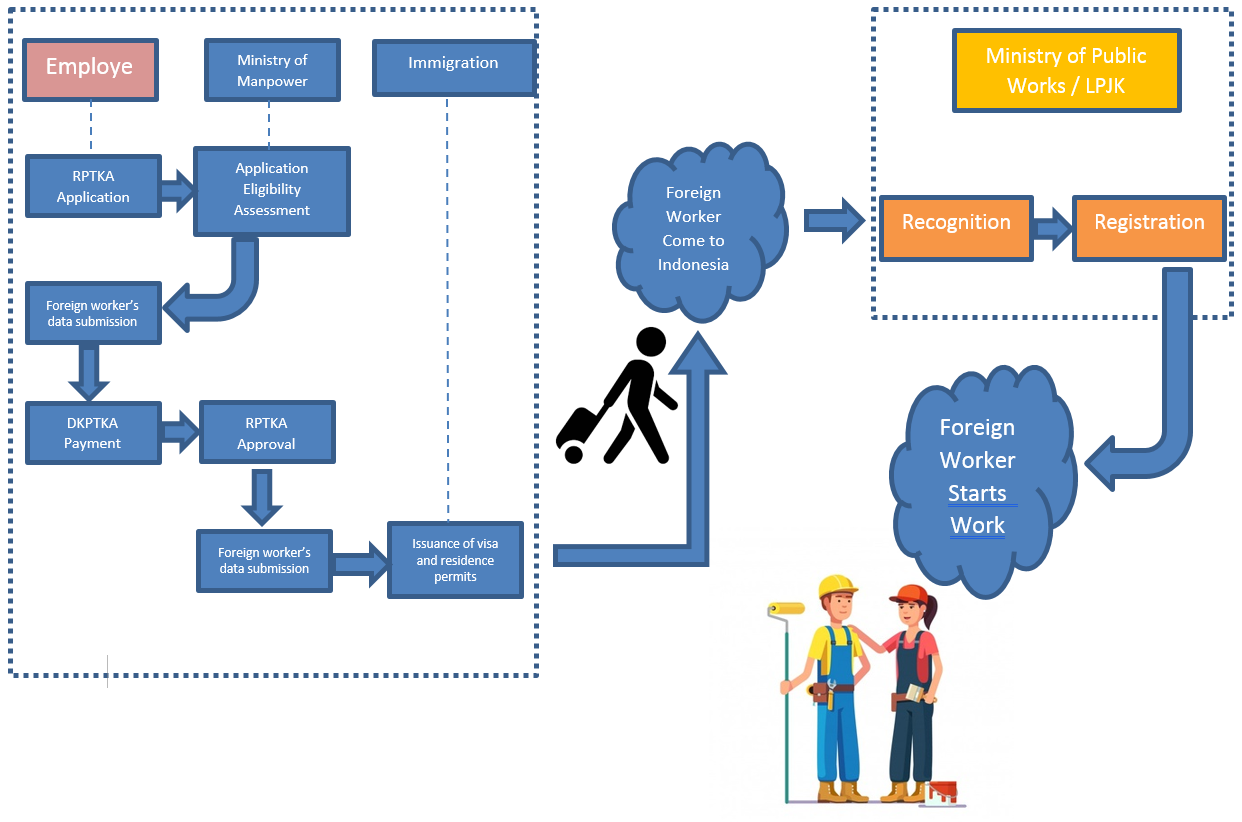The construction sector has become the government’s mainstay sector, especially when it comes to encouraging the National Economic Recovery from the COVID-19 pandemic. It is also a work field that still needs to use foreign workers, considering the need for special skills, especially those related to complex technology, For example, the Mass Rapid Transit project. In addition, foreign workers are used for work when the source of funds comes from investment, such as the Jakarta-Bandung high-speed rail work, which has investors from China, and the development resources, such as technology, materials, and experts are ensured in accordance with the standards held by the investor. Therefore, the government asks investors to train Indonesian workers and transfer technology to them.
Law No. 11 of 2020 concerning Job Creation (“Omnibus Law“) and Government Regulation No. 34 of 2021 concerning the Use of Foreign Workers (“GR 34/2021”) stipulates that foreign workers can only be employed in Indonesia in an employment relationship for certain positions and for a certain period of time and must be competent in accordance with the position to be occupied. Work permits are under the authority of the Ministry of Manpower and have become the basis for issuing entry permits and residence permits in Indonesia. The work permit is submitted by the employer in the form of the Foreign Worker Utilization Plan (Rencana Penggunaan Tenaga Kerja Asing or “RPTKA”) before employing foreign workers.
The approval of work permits no longer requires recommendations from the relevant Ministries/Technical Departments. Thus, in order to ensure the competence of foreign workers in the construction sector, the Ministry of Public Works issued a policy on skill recognition and the registration of foreign construction workers. This policy is imposed on foreign workers after the employment and immigration licensing processes are completed but before they start the construction work services.
RECOGNITION OF FOREIGN CONSTRUCTION WORKERS

The use of construction workers with expert qualifications shall also consider minimum remuneration standards. Minimum remuneration standards are set based on qualifications, professional experience and education level. In every construction project implementation, the provisions on technology transfer must be included in the contract and must use more Indonesian workers than foreign workers for positions at the expert level.
The Construction Services Development Institution (Lembaga Pengembangan Jasa Konstruksi – LPJK) ensures the fulfillment of the requirements for foreign workers by examining the minimum bachelor’s diploma, minimum 5 (five) years of experience, and certificates or evidence of competency recognized by the country of origin, which are in accordance with the qualifications, classification, and sub-classification for positions occupied by foreign workers.
The skill recognition results will recognize the competence of the foreign workers in performing construction services in accordance with the permit that has been obtained in accordance with applicable regulations. However, if there is a discrepancy, the LPJK can submit recommendations to the employer regarding the need to reconsider the use of the relevant foreign workers and the employer needs to take full responsibility for further assignments.
In carrying out supervision, the Ministry of Public Works coordinates with competent labor inspectors from the Ministry of Manpower. Monitoring and evaluation of compliance with the qualifications, classification, and sub-classification of foreign construction workers with respect to the work positions occupied, the use of Indonesian Co-Laborer (TKI Pendamping), as well as the implementation of knowledge and technology transfer are the responsibility of the Ministry of Public Works to be carried out at least once per year in collaboration with the Ministry of Manpower.
Schinder Law Firm has had years of experience helping companies in employment, especially in the utilization of foreign construction workers. Should you wish to do so, feel free to drop us an email at info@schinderlawfirm.com.